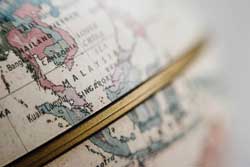Going to work in the UAE or Gulf region?
A big attraction of going to work in the Gulf is that there is no income tax and it is often seen as an exciting and invigorating place for upwardly mobile Brits with professional skills. When you are offered a job, the company that employs you will probably process the formalities required for getting you the work permit and this involves initially getting you a residence permit.
Before a visa can be granted, you will need all your personal and academic certificates certified by a notary and fully legalised. Note: only original birth or marriage certificates (or any type of certificate with a crown) can be legalised. The UAE authorities are extremely particular about the necessary documents and the absence of even one can result in your application being refused. Hence, you should be extremely careful that you have all the following documents:
1. Passport, which should have at least six months validity.
2. If you are accompanied by your spouse and children each one of them should have a separate passport.
3. There should not be any Israel visa entry on the passport.
4. Marriage certificate (if your spouse is accompanying you)
5. If you are a female employee and will have your children staying with you, you will need a letter of consent from the father of the children which is certified, notarised and attested.
6. Notarised copies of your academic certificates.
Please contact Notary.co.uk if you need any further information on any Gulf country.
The Gulf region is sometimes referred to as the GCC.
 This stands for Gulf Cooperative Council, which consists of the Kingdom of Bahrain, the State of Kuwait, the Sultanate of Oman, the State of Qatar, the Kingdom of Saudi Arabia and the United Arab Emirates.
This stands for Gulf Cooperative Council, which consists of the Kingdom of Bahrain, the State of Kuwait, the Sultanate of Oman, the State of Qatar, the Kingdom of Saudi Arabia and the United Arab Emirates.
More about the GCC
The Middle East area is also referred to as MENA (Middle East and North Africa.)

